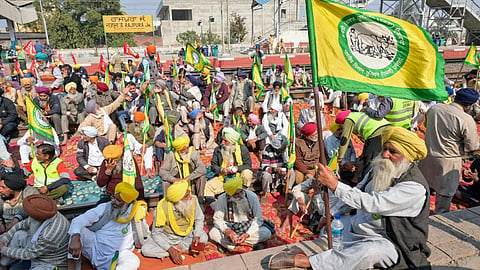When the Congress government first introduced Minimum Support Price (MSP) in India in 1966-67, it wasn’t due to an oversupply of crops. On the flip side, it was to encourage farming for certain crops. India wasn’t producing enough cereal to feed a large population post-independence. However, farmers were hesitant to produce crops like paddy and wheat simply because they wouldn’t fetch fair prices from the market despite requiring a lot of labour. So, the then government introduced MSP as an incentive to encourage farmers to produce these crops to feed the country
Of late, farmers from Punjab and Haryana have revived their Dilli chalo (march to Delhi) campaign, demanding a legal cover for MSP. The latest protests have gained salience because of the upcoming general election.
Worried that the protests could spread to Uttar Pradesh, the country’s most politically influential state, the Modi government has set up a ministerial committee, led by Piyush Goyal, commerce minister, to negotiate with the farmers. However, the committee’s latest efforts came to naught when the farmers’ union rejected its offer of a five-year plan involving the purchase of pulses, maize and cotton crops by government agencies at MSP. Farmer leaders said the proposal did not have clarity and they want MSP on all 23 crops and not just pulses, maize, and cotton crops.
Officials believe that a guaranteed MSP law will cost the government Rs6-9 lakh crore – about the annual average government spending on infrastructure development. It could take a toll on the government’s coffers and it may be left with no money for other developmental activity.
To get an idea of what MSP means for farmers, one has to see the issue from the farmer’s perspective. Take the situation when farmers reap a bumper harvest. That may not always be great news for farmers. What happens when there’s an oversupply of a commodity, but demand remains the same? Price will fall.
When farmers try to sell their produce, they hit a roadblock. Often, the excess supply pushes prices so low that they are not able to even cover their cost of production. They’re better off destroying the crops rather than paying additional charges to transport them for sale.
Not codified under law
It was to counteract such situations where farmers face losses, that the government introduced MSP. The idea was simple – every year, they’d buy certain crops from the farmers and store them for later use. And they would do this for 22 mandated crops. These crops would be distributed under various ration schemes. Or the government would keep it for a rainy day in a buffer, say when a bad monsoon hurts crop supply.
However, the MSP procurement isn’t codified under any law. So farmers fear that the government can turn their back on it at any point in time in the name of economic reforms. Of course, this will have serious political repercussions, but it’s still possible. That’s the primary demand of the protesting farmers. They want a law enacted around MSP.
One reason for that could be because an MSP doesn’t mean the government ends up buying all the produce. It buys a limited quantity based on how much it can store and distribute within the country. And that also majorly benefits two crops – wheat and rice. Those farming the other crops can still often be left in a lurch.
But is legalising MSP a feasible idea? There are arguments from both sides. Economists aligned with the government tell you that only about 6 per cent of farmers in the country benefit from MSP. Other figures peg it at 15 per cent-25 per cent.
Ashok Gulati, a leading agricultural economist, believes that if MSP is legalised, that will mean no one can pay less than MSP to buy a crop. That will distort the demand-supply scene. His argument is simple – if there’s an oversupply of crops in the market and prices fall, people still have to buy crops at the minimum price set by the government. Anyone buying at prices below the legal MSP could face legal action.
The issue is important because while agriculture generates at least 15 per cent of the GDP, it accounts for employment for almost half of our population. Without adequate support, farmers may lose money, they may end up in a debt spiral, and many of them might even be forced to leave farming altogether.
Those supporting the demand say that an MSP guarantee will likely help with crop diversification. As the government only favours procurement of paddy and wheat simply because it needs more of it to supply food to the poor, farmers are loathe to switch to producing only those crops.

